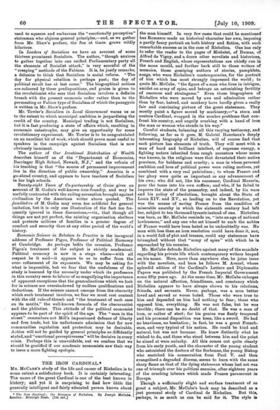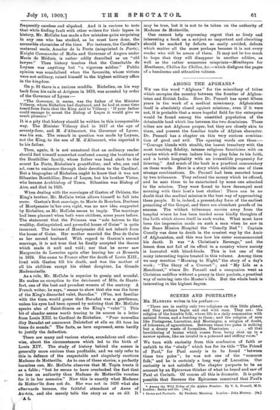THE IRON CARDINAL.*
McCiBB's study of the life and career of Richelieu is to some extent a satisfactory book. It is certainly interesting. The name of the great Cardinal is one of the best known in history; and yet it is surprising to find how little the generally intelligent and fairly educated person knows about • The Iron Cardinal : the Romance of Bichslise. By Joseph McCabe. London: Breleigh Nash. [15s. net.]
the man himself. In very few cases that could be mentioned' has Romance made an historical character her own, imposing a partly fancy portrait on both history and fiction, with such remarkable success as in the case of Richelieu. One has only to refer the reader to the pages of Michelet, of Dumas, of Alfred de Vigny, and a dozen other novelists and historians, French and English, whose representations are chiefly run in the same mould, and further back still to those writers of memoirs, those gossiping authors of stories, pamphlets, songs, who were Richelieu's contemporaries, for the portrait of him which has most strongly impressed the world ; to quote Mr. McCabe, "the figure of a man who lives in intrigue, amidst an army of spies, and betrays an astonishing fertility of resource and stratagems." Even those biographers of Richelieu who were moved by awe and admiration rather than by fear, hatred, and mockery have hardly given a really fair and convincing picture of the great statesman. They mostly paint a figure moved by machinery,—"a stern and austere Cardinal, wrapped in the sombre problems that con- front his country, and angrily crushing with a hand of iron the man or woman who stands in his way."
Careful students, balancing all this varying testimony, and following, as far as it goes, M. Gabriel Hanotaux's deeply interesting biography of Richelieu, will of course find that each picture has elements of truth. They will meet with a man of hard and brilliant intellect, of supreme energy, a fighting nature inherited from rough ancestors whose name was known, in the religious wars that devastated their native province, for boldness and cruelty ; a man in whom personal ambition and love of political power were ruling motives, yet combined with a very real patriotism ; to whom France and her glory were quite as important as any advancement of his own; who did not, like his successor, Cardinal Mazarin, pour the taxes into his own coffers; and Who, if he failed to improve the state of the peasantry, and indeed, by his wars and his policy of absolutism, brought about the State of Louis XIV. and XV., so leading on to the Revolution, yet was the means of saving France from the condition of miserable anarchy in which the sixteenth century had left her, subject to ten thousand tyrants instead of one. Richelieu was born, as Mr. McCabe reminds us, "into an age of national lawlessness," and any one who set himself to curb the nobles of France would have been hated as he undoubtedly was. No man with less than an iron resolution could have done it, nor, in a world full of plot and treason, could any statesman have triumphed without that "army of spies" with which he is reproached by his enemies.
Mr. McCabe defends Richelieu against many of the scandals regarding his private life which contemporary writers heaped on his name. Here, more than anywhere else, he joins issue with the novelists, and here he follows M. Avenel, whose splendid edition of the Cardinal's Letters and Diplomatic Papers was published by the French Imperial Government some fifty years ago. At the same time, Mr. McCabe enlarges on the natural affection, friendliness, and constancy which Richelieu appears to have always shown to his relations, friends, and servants. Never, perhaps, was a man better loved and served or worse hated. Those who were true to him and depended on him had nothing to fear; those who opposed him, everything. He was not false, but he was terrible; there can be no doubt of that. He was a man of iron, or rather of steel; for his genius was finely tempered and his personal disposition was keen, like a sword. He had no heaviness, no hesitation ; in fact, he was a great French- man, and very typical of his nation. He could be kind and natural, but was not humane. He knew distinctly what he wished to do, and those who stood between him and the point he aimed at were unlucky. All this comes out quite clearly from his early youth, and the character of the young student who astonished the doctors of the Sorbonne, the young Bishop who snatched his consecration from Paul V. and then evangelised a degraded diocese, seems to burn with the same sharp flame as that of the dying statesman whose last act was one of triumph over his political enemies, after eighteen years of the crushing labours which made France paramount in Europe.
Though a sufficiently slight and surface treatment of so great a subject, Mr. McCabe's book may be described as a
just personal study of Cardinal de Richelieu. But this, perhaps, is as much as can be said for it. The style is frequently careless and slipshod. And it is curious to note that while finding fault with other writers for their lapses in history, Mr. McCabe has made a few mistakes quite surprising in any one who has studied, as he must have done, the accessible chronicles of the time. For instance, the Cardinal's maternal uncle, Amador de In Porte (misprinted la Paris,), Knight Commander of Malta and Governor of Angers under Marie de Medicis, is rather oddly described as an "old lawyer." Then history teaches that the Connetable de
Luynes was anything but "a vigorous soldier." Public Opinion was scandalised when the favourite, whose virtues were not military, raised himself to the highest military office in the kingdom.
On p. 91 there is a curious muddle. Richelieu, on his way back from his exile at Avignon in 1619, was arrested by order of the Governor of Lyons :—
"The Governor, it seems, was the father of the Minister Villeroy, whom Richelieu had displaced, and he had at some time heard from Paris that the King said to Villeroy If your father could manage to arrest the Bishop of Lucou it would give us much pleasure.'" It is a pity that history should be written in this irresponsible way. The Minister Villeroy died in 1617 at the age of seventy-four, and M. d'Alincourt, the Governor of Lyons. was his son. The remark in question was made by Luynes, not the King, to the son of M. d'Alincourt, who reported it to his father.
Then, again, it is not unnatural that an ordinary reader should find himself somewhat confused among the brothers of the Bouthillier family, whose father was head clerk to the arocat La Porte, Richelieu's grandfather, and who, one and all, rose to eminence through their devotion to the Cardinal. But a biographer of Richelieu ought to know that it was not Sebastian Bouthillier, Dean of Lucon, but his brother 'Victor, who became Archbishop of Tours. Sebastien was Bishop of Aire, and died in 1625.
When dealing with the marriages of Gaston of Orleans, the King's brother. Mr. McCabe twice allows himself to fall into error. Gaston's first marriage, to Marie de Bourbon, Duchess of Montpensier in-her own right, was no new idea suggested
by Richelieu, as Mr. McCabe seems to imply. The marriage had been planned when both were children, some years before.
The statement that the Princess was "sole heiress to the wealthy, distinguished, and powerful house of Guise" is quite incorrect. The heiress of Moutpeusier did not inherit from the house of Guise. Her mother married the Duc de Guise as her second husband. With regard to Gaston's second marriage, it is not true that he finally accepted the decree which made it null and void; nor that he never saw Marguerite de Lorraine again after leaving her at Brussels in 1634. She came to France after the death of Louis XIII., lived with Gaston till his death, aud was the mother of all his children except his eldest daughter, La Grande
Mademoiselle.
As a rule, Mr. McCabe is superior to gossip and scandal.
He makes an exception to the detriment of Mlle. de Haute- fort, one of the best and proudest women of the century. A French writer, he says, " seems to show that she was the lover of the King's discarded valet, Barodas." (Who, not familiar with the time, would guess that Baradat was a gentleman, unless his eyes had been opened by noticing that Mr. McCabe speaks also of Saint-Simon as the King's "valet"!) This bit of slander seems worth tracing to its source in a letter from Louis XIII. to Cardinal de Richelieu. "Pour nouvelles dicy Baradat est amoureux Delotefort et elle en dit tous les biens du monde." The facts, as here expressed, seem hardly to justify the deduction.
There are many and various stories, scandalous and other- wise, about the circumstances which led to the birth of Louis XIV. The study of history behind the scenes is generally more curious than profitable, and we only refer to this in defence of the respectable and singularly cautious Madame de Motteville. As to one of these stories, a perfectly harmless one, Mr. McCabe observes that M. Topin treats it as a fable ; "but he seems to have overlooked the fact that no less an authority than • Madame de 3fotteville vouches for it in her memoirs." Now this is exactly what Madame de Mottev'lle does not do. She was not in 163$ what she afterwards became, the faithful attendant of Anne of Austria, and she merely tells the story as an on dit. It may be true, but it is not to be taken on the authority of Madame de Motteville. •
One cannot help expressing regret that so lively and interesting a book on a subject so important and absorbing should be marked by defects so easily avoided; defects which matter all the more perhaps because it is not every reader who will be aware of them. It may not be too much to hope that they will disappear in another edition, as well as the rather numerous misprints—Monfbayun for Mont bazon, Chilton for Chillou, &c.—which disfigure the pages of a handsome and attractive volume.











































 Previous page
Previous page